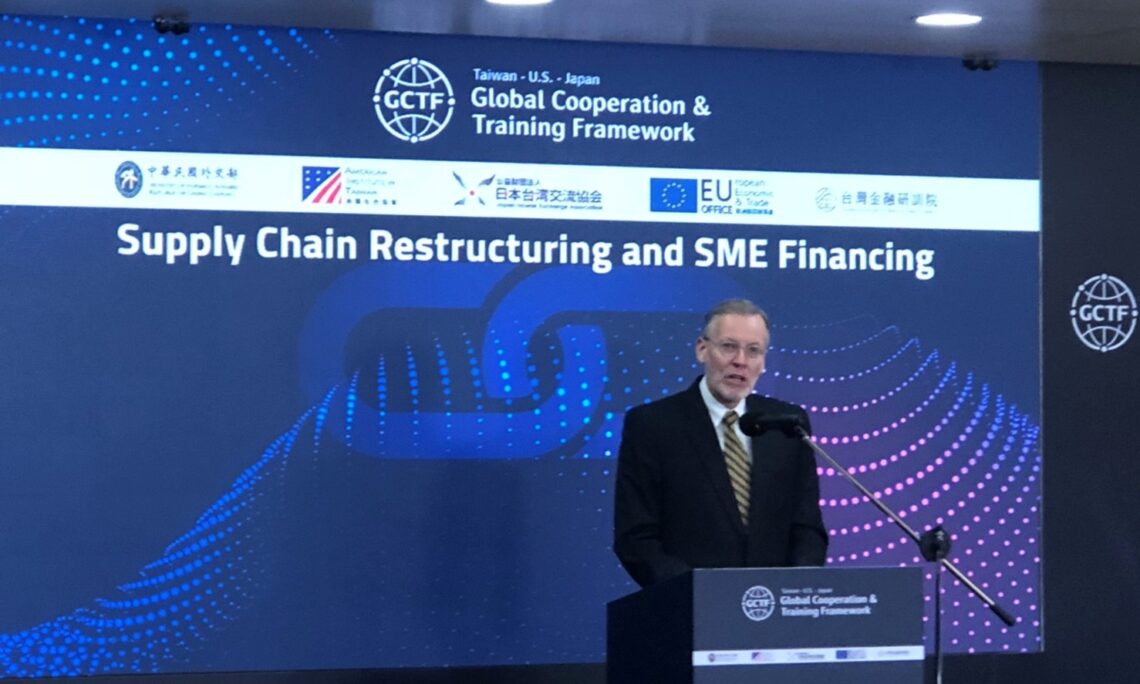OT-2112
April 14, 2021
Remarks by AIT Director W. Brent Christensen
at the virtual Global Cooperation and Training Framework
on Supply Chain Restructuring and SME Financing
April 14, 2021
(As Prepared for Delivery)
Minister Wu, Representative Izumi, Representative Grzegorzewski, President Huang, distinguished panelists, and audience members, it is my pleasure to welcome you to this workshop on supply chain restructuring and Small and Medium Enterprise financing held under the Global Cooperation and Training Framework or GCTF.
Well before the devastation wrought by the global pandemic made countries around the world consider the vulnerabilities of their supply chains, we at AIT recognized the shifting trends in global supply chains and the critical role that Taiwan can play. Over the past year and a half, we have been closely working with Taiwan on the promotion of global supply chain resiliency, making this an ideal topic for a GCTF workshop today.
So far, the work we have accomplished with Taiwan and other partners has been a great success in raising awareness on a key policy priority.
I would like to take a moment to note some of the key highlights from last year. In September 2020 on the margins of the Czech Senate President’s visit to Taiwan, we co-hosted a forum with Japan and the EU on Supply Chain Restructuring entitled: Improving Resilience Among Likeminded Partners. Then, last November during the U.S. 2020 Indo Pacific Business Forum, Taiwan hosted a session on the Taiwan Model on COVID-19, which focused on Public Private Partnerships in the Medical Industry. Finally, it is worth noting that last year the United States and Taiwan launched the historic Economic Prosperity Partnership Dialogue (EPPD), which established a senior-level framework for increased cooperation with Taiwan through regular working groups on topics like supply chain resilience and high-tech cooperation.
These activities and discussions have shed light on that fact that, across the globe, firms are seeking alternative production and manufacturing hubs, as they increasingly recognize the dangers of linking their futures to a single production source.
However, not every company or supply chain can easily be brought back to its home country. As a result, many companies are seeking partnerships in the United States and in other like-minded economies to build out the new supply chains of the future. Helping economies, sectors, and companies to build out secure supply chains will require a coordinated effort from all of us here today.
Many of you know that in February of this year, the United States issued an executive order on supply chain resiliency. As President Biden noted, “building resilience will mean increasing production of certain types of elements in the United States. It will also “mean working more closely with our trusted friends and partners that share our values, so that our supply chains cannot be used against us as leverage.”
With the new executive order, the United States has a unique opportunity to continue to build upon our supply chain restructuring efforts that we started in Taiwan last year. In this effort to secure critical supply chains we are eager to partner with like-minded countries and partners who share similar values of trust, rule of law, and strong protections of intellectual property. We believe these shared values, in turn, will enrich communities and economies throughout the Indo Pacific.
The experts and practitioners from Taiwan, Japan, EU, and the United States who are participating in this workshop have tremendous knowledge and experience to share today. During this virtual workshop, I hope that everyone will find something of value that is applicable to your own environment to further boost the resilience of global supply chains, making each of our economies stronger as we develop our global economy for the modern era.
Once again, we wish all participants a successful workshop and thank our co-hosts Taiwan, Japan, and, for the first time, the EU, for their support.
Thank you.
















![Video Thumbnail [Recovered]-01](../wp-content/uploads/sites/269/Video-Thumbnail-Recovered-01-1-750x450.jpg)





